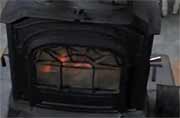
WEDNESDAY, Jan. 9 (HealthDay News) — Reductions in air pollution from wood-burning stoves led to a lower risk of death among residents of an Australian community — especially among men, a new study suggests.
For the study, researchers looked at data from Launceston — a city in the state of Tasmania — where efforts to encourage the use of electric heating and reduce wood smoke pollution began in 2001. As a result, the use of wood stoves fell from 66 percent to 30 percent of homes, leading to a 40 percent decrease in wood smoke pollution during the winter.
The reductions in deaths between 1994-2001 and 2001-2007 for males and females combined were not considered statistically significant: less than 3 percent for all causes, 5 percent for cardiovascular-related death and about 8 percent for respiratory-related death.
But reductions were deemed significant when the researchers looked at men alone: about 11 percent for all causes, 18 percent for cardiovascular-related death and nearly 23 percent for respiratory-related death, according to the study published online Jan. 8 in the BMJ.
Reductions during the winter months (June to August) were even higher: 20 percent for cardiovascular-related deaths and 28 percent for respiratory-related deaths, reported Fay Johnston, of the University of Tasmania, and colleagues.
The findings suggest that male deaths from all causes, but particularly cardiovascular- and respiratory-related causes, could be significantly lowered by reducing exposure to wood smoke, the study authors concluded.
While the study found an association between lower rates of death among men and reduced use of wood stoves, it did not prove a cause-and-effect relationship.
More information
The U.S. Environmental Protection Agency offers an overview of indoor air quality.

